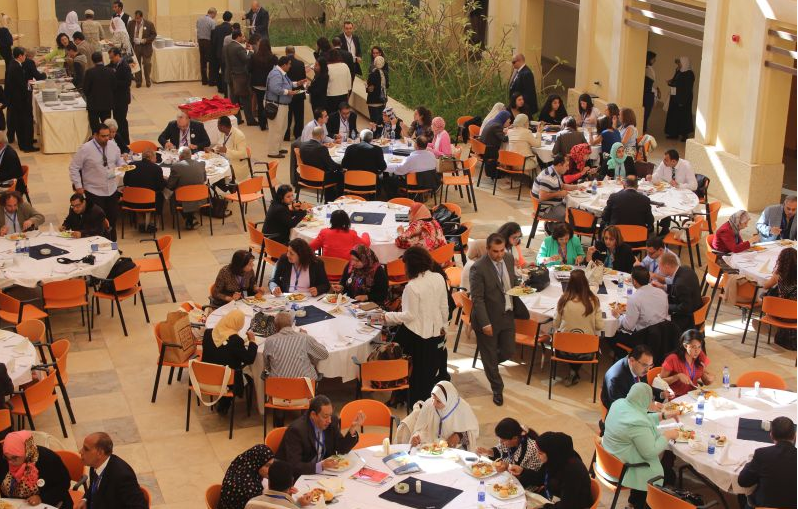2015 Conference

Peter Van Rooij
Director of ILO Decent Work Team for North Africa/Cairo
Ahmed Osman
President, Middle East Council for Small Business Entrepreneurship (MCSBE)
Organized by the ILO Decent Work Team for North Africa/Cairo and the Middle East Council for Small Business & Entrepreneurship (MCSBE), the 1st Social Entrepreneurship Knowledge Sharing Conference in Elgouna, Egypt brought together entrepreneurs, experts, and academics from around the world. As the first of a series of annual conferences in the domain of entrepreneurship, the emphasis of this conference was to demonstrate the international best practices in this field as well as show case Egyptian experiences gained through the years.
Accordingly, this conference had been organised around keynote speeches, workshops, panel discussion in order to allow for experience and knowledge sharing and networking opportunities. Entrepreneurs were advised to maximize their personal involvement, engagement and networking by getting hands-on knowledge at the Social Business Lab.
Egypt has witnessed a series of political events over the past few years which have given a high priority to focusing on the social entrepreneurship. There are continuing arguments over precisely who counts as a social entrepreneur. Thus far, there has been no consensus on the definition of social entrepreneurship, so many different sorts of fields and disciplines are associated with social entrepreneurship.
The Sessions
1) How to create eco-system for Social Entrepreneurship?
Due to elaborated Eco-systems in many countries, social enterprises have been established successfully, providing a range of products and services whilst also delivering social value. Governments are now supporting social entrepreneurship through several ways, amongst these ways we can find: commissioning and procurement, providing innovative finance models, delivering public services, providing business support for social enterprises, removing regulatory barriers to unlock private investment, etc. The session will discuss the main elements of social business Eco-system.
2) The Role of the Business Organizations in Social Entrepreneurship
Social entrepreneurship is increasingly popular as a way of doing business while achieving a social and economic impact. Businesses that look beyond corporate social responsibility and business associations who are introducing entrepreneurial values into their organizations are experimenting with the concept of social entrepreneurship and moving towards each other. Last decade has brought remarkable growth in social entrepreneurship organizations, including firms that pursue corporate social responsibility policies, socially responsible investment firms, and environmentally friendly firms. In addition, much attention has focused on a broad but vaguely defined group of “hybrid organizations” which are commonly referred to as “social enterprises”; these include microfinance institutions, businesses that sell fair trade products, work integration firms, and companies that sell affordable products in developing countries (e.g., eyeglasses and bed-nets). Goals of the session will be to discuss the opportunities which social entrepreneurship can bring to private sectors/ and organizations in general in order to have a bigger role in the prosperity and well-being of the societies.
3) Social Business Finance
The impact investment or Social Business Finance exists to raise and connect capital to achieve the maximum possible social impact. Hundreds of impact investment funds are working all over the world to provide simple finance for charities, trusts and social enterprises in the form of loans, grants and other investment products. Companies are spending increasing amounts on social investment, despite the global financial crisis. US$381 billion was transferred from developed countries to the developing world in 2011 through private sector investment and philanthropy, a 35% increase from US$281 billion in 2009 including US$322 billion of private capital and US$59 billion of philanthropy.
The goal of the session are to discuss the central role of finance to support and boost social entrepreneurship. The outcomes of this session can be elaborated within some recommendations and suggestions which can be adopted by the financial institutions to boost the social entrepreneurship eco-systems in Egypt.
4) Community and city Planning to Foster Social Entrepreneurship
It seems it is good community management to have a city plan. Governors and city councils are somehow more informed as to how to meet the future with ten and twenty year plans in file drawers. Whether the citizens of a city might be the better for these exercises is open to question but planning is certainly good for urban planners and architects who prepare them.
Critical analysis revealed several remarkable features. First, none of the plans ever spoke of what the city’s population might be at the end of the planning period! The singular measure of whether a city is succeeding or not, namely how many people chose to live there or have jobs to keep them in a particular place, is unexamined. So, too, is the question of what the profile of persons in poverty will be by the target year. Given that the ratio of poor residents who subsist on transfer payments to persons in families that are selfsupporting is among the most important measures of what a city’s economy looks like and will look like it is hard to imagine how anyone can try to better a city’s future, the stated ambition of all plans, without trying to prescribe what the poverty ratio might be. Finally, not one of the plans discussed the cost of running the city, certainly not the size of the public payroll and the associated benefit costs, including in most cities, the unfunded costs of pensions for retired and current public servants. This session will be the first of its kind to shed light on city planning as a tool to foster social entrepreneurship, whether it being a new city or urban regeneration or informal settlement improvement.
5) Community Engagement as a Driver for Social Entrepreneurship
Social entrepreneurship should be the new engagement for individuals and the public and private sectors. The importance of business involvement in social networks and semi-public activities could be viewed from two perspectives. The first is the view that the government’s role was rapidly changing, and more non-profit and profit-driven partners could become involved in maintaining good education, healthcare and welfare levels. The second is the view, where the focus revolved around the importance of business in combating corruption. Social entrepreneurship should be the new engagement for mechanism for individuals and public and private organizations. The public sector has been changing worldwide, being under pressure to become smaller and thus not being the only arena from which solutions will come. The private sector and community will be crucial in influencing policies and in creating public value for citizens.
6) Nawah Social Entrepreneurship Competition
ILO & MCSBE have partnered to organize Nawah, a social entrepreneurship idea competition targeting Egyptian’s aged 18 to 35. Ten finalists will attend this conference to pitch and win the top three prizes. An interdisciplinary expert jury panel will select the winners.
7) Social Business Lab (How to Start your Social Business)
The idea of social entrepreneurship is not new. The legacy of social entrepreneur’s even reaches back to include historical figures, however, the term “social entrepreneur” became much more widespread in the 1980s and 1990s, and today the movement is picking up more speed than ever. A socially entrepreneurial organization, named as social business, takes the goal of creating social impact to a new level by using innovative methods to organize, manage and measure a venture. If you’re looking to make high impact in the social change arena and have a new, enterprising plan on how to do it, starting your own social business, this session will give you some tips on how to start a social business that can survive, thrive, and even change the world.
8) ILO Social Entrepreneurship Tool Kit
This session will give a clear explanation of the ILO Social Entrepreneurship Tool Kit “How to Start a Social Business that can survive, thrive, and even change the community.
Based on best practices, the ILO has developed this Start Your Social Business manual, which provides a step-by-step guide for local communities on how to start a viable social businesses. The manual presents innovative technologies and disposal methods involving awareness-raising and behavioral changes.
9) International Best Practices
Social entrepreneurs are people with potential to make positive change and passion to solve a social problem in the world, they have an idea for a solution and entrepreneurial qualities to carry out that solution, determined to make their idea a reality. Accordingly, social enterprises are a diverse set of organizations that do not easily fit within a single definition. The session will be to dedicate to the international experiences in social entrepreneurship. The session will have as objective to highlight the major characteristics of social entrepreneurs who are pioneering the filed in the world today. It will discuss the best practices in establishing and managing successful social businesses, the latest ideas, initiatives as well as the international trends in social entrepreneurship & creation of social enterprises.
10) Social Business Lab (How to Start your Social Business)
The idea of social entrepreneurship is not new. The legacy of social entrepreneur’s even reaches back to include historical figures, however, the term “social entrepreneur” became much more widespread in the 1980s and 1990s, and today the movement is picking up more speed than ever. A socially entrepreneurial organization, named as social business, takes the goal of creating social impact to a new level by using innovative methods to organize, manage and measure a venture. If you’re looking to make high impact in the social change arena and have a new, enterprising plan on how to do it, starting your own social business, this session will give you some tips on how to start a social business that can survive, thrive, and even change the world.
11) Education & Social Businesses
Social enterprise, social impact investment and social innovation are utilizing entrepreneurship and business strategy to tackle social problems, improve communities, people’s life chances, and the environment. A new breed of social enterprises are relieving education of budgetary burdens and providing inspirational experiences. The session will have as objective to highlight the application of education and role of social entrepreneurs to face certain challenges. It will discuss the best practices in establishing and managing education social businesses, the latest ideas.
12) Data, Innovation & Social Businesses
A social innovation is a novel solution to a social problem that is more effective, efficient, sustainable, or just than current solutions. The value created accrues primarily to society rather than to private individuals. Social innovation focuses attention on the ideas and solutions that create social value – as well as the processes through which they are generated, not just on individuals and organizations.
13) Empowering Women through Social Entrepreneurship
Women’s cooperatives offer self-employment opportunities that can contribute to women’s social inclusion and empowerment. This session seeks to broaden existing understandings of women’s entrepreneurship by focusing on some types of social entrepreneurial venture in Egypt.
14) Technology and Social Innovation
Technology for the sake of technology is a waste of precious resources. Social entrepreneurs need to understand the deep value that ICT can bring to social change when it is offered in context, with appropriate training, and with the intent of empowering the user. Technology can empower social entrepreneurship initiatives by allowing access to information, creating business value, and enabling new capabilities although not every technology initiative succeeds. This session will focus on Technology and its cross route with Social Innovation.
15) Social Business in Culture (Art Show)
If more of artists become social enterprises, arts organizations could become less fragmented and less reliant on public funding. Social enterprise is thriving and rapidly expanding, and the creative sector is one of the fastest growing in western countries. This session seeks to provide deep understandings of cultural entrepreneurship by focusing on some successful cultural social entrepreneurs in Egypt.

2015 Conference Highlights



